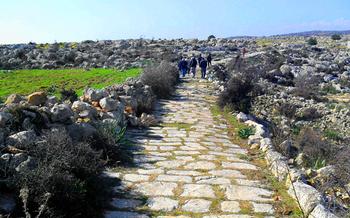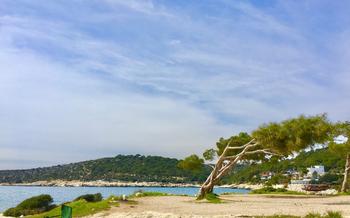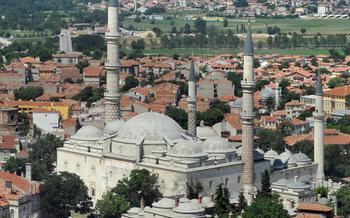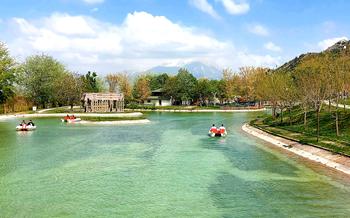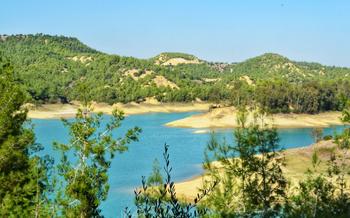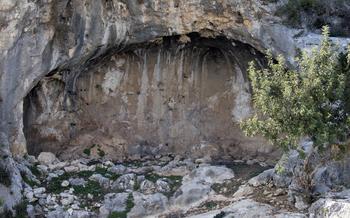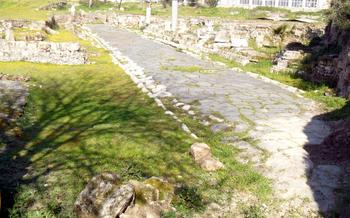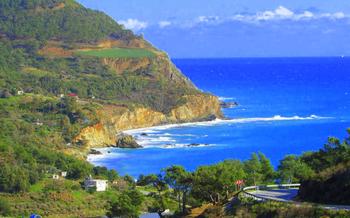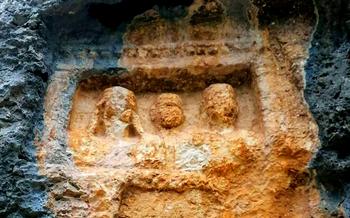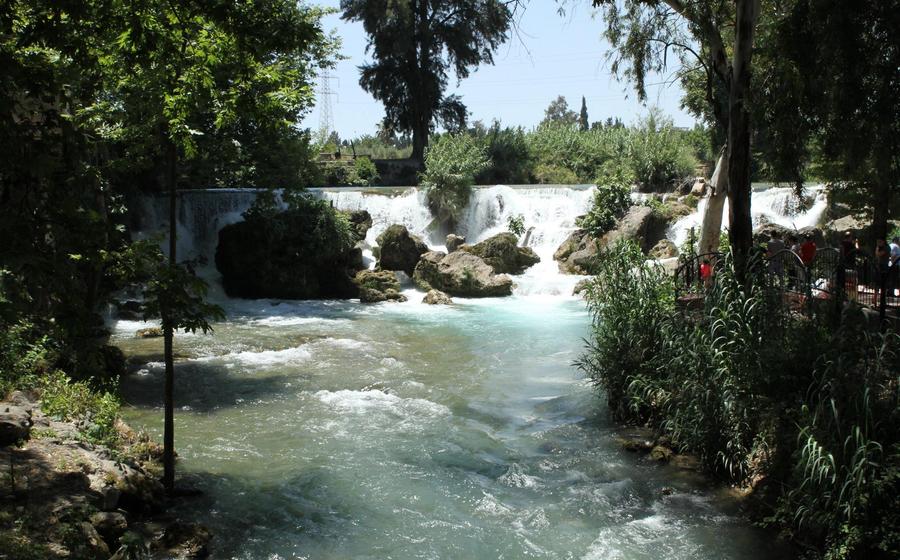
Tarsus Waterfall
- Tarsus Waterfall: A Hidden Gem in Mersin
- The Legend of Tarsus Waterfall
- Exploring the Waterfall and Surrounding Area
- Transportation to Tarsus Waterfall
- Best Time to Visit Tarsus Waterfall
- Accommodation Options in Tarsus
- Safety and Precautions at the Waterfall
- Off-the-Beaten-Path Experiences
- Ecological Importance of Tarsus Waterfall
- Local Cuisine and Gastronomic Delights
- Photography Tips for Capturing the Waterfall's Beauty
- Shopping for Souvenirs and Local Crafts
- Language and Communication in Tarsus
- Insider Tip: Hidden Cave Adventure
Tarsus Waterfall: A Hidden Gem in Mersin
Nestled in the picturesque landscape of Mersin, Turkey, the Tarsus Waterfall cascades majestically down a rocky cliff, forming a tranquil oasis amidst the bustling city. Its historical significance dates back centuries, as it was once a sacred site for ancient civilizations that revered its natural beauty and healing properties. Today, the waterfall remains a significant landmark, drawing both locals and tourists who seek respite from the urban hustle and bustle. Geographically, the waterfall is situated just a short drive from Tarsus city center, making it easily accessible for visitors seeking a refreshing escape into nature's embrace. The surrounding landscape boasts lush greenery, towering cliffs, and panoramic vistas, creating a serene and captivating backdrop for this hidden gem.
The Legend of Tarsus Waterfall
Tarsus Waterfall is deeply intertwined with local folklore and mythology, inspiring a captivating legend that has been passed down through generations.
Exploring the Waterfall and Surrounding Area
Venturing beyond the mesmerizing cascades of Tarsus Waterfall unveils a wealth of natural wonders waiting to be discovered. Embark on a refreshing hike along designated trails that wind through lush forests, leading to breathtaking viewpoints that offer panoramic vistas of the waterfall and its surroundings. Capture the beauty of nature's artistry as you witness the sunlight dancing on the shimmering waters, creating a picturesque spectacle that will forever be etched in your memory.
For those seeking a refreshing escape, designated swimming spots beckon you to immerse yourself in the cool, invigorating waters of the waterfall. Plunge into the natural pools, surrounded by lush greenery, and let the gentle currents massage away your worries. As you bask in the tranquility of this hidden oasis, let the sounds of cascading water and birdsong serenade you, creating a symphony of nature that will soothe your soul.
Nature enthusiasts will delight in the diverse wildlife that calls the Tarsus Waterfall area home. Keep an eye out for shy deer grazing in the meadows, colorful butterflies fluttering through the air, and a variety of bird species, including eagles soaring overhead. With a bit of patience and luck, you may even spot rare and endangered species that have found refuge in this pristine habitat.
For the adventurous at heart, secret passages and hidden caves await exploration. Discover the thrill of venturing into the unknown as you navigate through narrow tunnels and emerge into hidden chambers adorned with stalactites and stalagmites. Let your imagination run wild as you envision the stories these hidden spaces hold, creating an unforgettable adventure that will leave you craving more.
Transportation to Tarsus Waterfall
Reaching Tarsus Waterfall is a breeze, whether you prefer public transportation, guided tours, or the freedom of a self-guided road trip. From Mersin city center, hop on a local bus or minibus that will take you directly to the waterfall's entrance. The journey offers scenic views of the countryside and takes approximately 45 minutes. For a more personalized experience, book a private tour that includes pickup from your hotel, a knowledgeable guide, and insights into the region's history and culture.
If you prefer to explore at your own pace, renting a car is an excellent option. The roads are well-maintained, and the drive from Mersin to Tarsus takes about 30 minutes. Once you arrive, ample parking facilities are available near the waterfall's entrance, ensuring a hassle-free visit.
Best Time to Visit Tarsus Waterfall
The beauty of Tarsus Waterfall transforms with the seasons, offering unique experiences throughout the year. In spring, the waterfall bursts with life as the snow melts from the Taurus Mountains, creating a powerful cascade. The surrounding landscape is painted in vibrant colors, with wildflowers blooming in abundance.
Summer brings warm weather, making it an ideal time for swimming and picnicking by the waterfall. The water temperature is pleasant, and the sun-drenched rocks provide a perfect spot to relax and soak up the natural beauty.
Autumn offers a different kind of charm, as the leaves change color, creating a picturesque backdrop for the waterfall. The air is crisp and cool, making it perfect for hiking and exploring the surrounding trails.
Winter transforms the waterfall into a winter wonderland, with snow-covered peaks and frozen cascades. While swimming is not advisable during this time, the stunning scenery makes it a popular destination for photographers and nature enthusiasts.
To capture the waterfall's beauty at its peak, spring and autumn are the ideal seasons. The weather is generally mild, and the crowds are smaller, allowing you to fully immerse yourself in the tranquility of the waterfall.
Accommodation Options in Tarsus
Tarsus offers a range of accommodation options catering to different travel styles and budgets. For those seeking convenience and proximity to the waterfall, several hotels and guesthouses are located nearby. These establishments provide comfortable lodging with modern amenities, allowing visitors to relax and recharge after a day of exploring.
For nature enthusiasts who prefer a more immersive experience, camping and caravan parks offer a unique opportunity to stay amidst the natural beauty of the surroundings. These facilities provide designated camping grounds, equipped with basic amenities such as restrooms and showers. Campers can enjoy the tranquility of the wilderness while still having access to essential conveniences.
Homestays and local hospitality experiences provide an authentic glimpse into the culture and lifestyle of Tarsus. Visitors can immerse themselves in the local community by staying with local families, sharing meals, and participating in traditional activities. This immersive experience allows travelers to connect with the locals, learn about their customs, and gain a deeper understanding of the region.
Budget-friendly options are available for backpackers and budget travelers, including hostels and guesthouses that offer dormitory-style accommodations. These establishments provide a social and communal atmosphere, allowing travelers to meet fellow adventurers and share travel stories.
Safety and Precautions at the Waterfall
The Tarsus Waterfall is a natural wonder, but it's crucial to prioritize safety while exploring its beauty. Water currents can be unpredictable, especially after heavy rainfall, so swimming should only be done in designated areas under the supervision of a lifeguard. Proper footwear is essential for hiking on slippery rocks and uneven terrain. Avoid wearing flip-flops or sandals, and opt for sturdy shoes with good traction. Respecting local customs and traditions is paramount. Swimwear should be modest, and revealing clothing should be avoided in public areas. Emergency contact information should be readily available, and it's advisable to inform someone about your hiking or swimming plans.
Off-the-Beaten-Path Experiences
Venture beyond the waterfall's main cascades and discover hidden gems that await the intrepid traveler. Trek to secluded viewpoints that offer panoramic vistas of the surrounding landscape, capturing breathtaking moments of natural beauty. Explore nearby villages and engage with the warm and welcoming locals, immersing yourself in their daily lives and uncovering their rich cultural heritage. Indulge in culinary adventures, savoring local delicacies that showcase the region's unique flavors and culinary traditions. Embrace the spirit of discovery and create unforgettable memories in the lesser-known corners of Tarsus.
Ecological Importance of Tarsus Waterfall
Beyond its scenic beauty, Tarsus Waterfall holds significant ecological value. The waterfall and its surrounding ecosystem are home to diverse flora and fauna, some of which are unique to this region. The lush greenery, cascading waters, and rocky cliffs create a microclimate that supports a variety of plant and animal species. Visitors can spot colorful birds, butterflies, and insects flitting among the trees and flowers. The waterfall also serves as a natural habitat for fish and other aquatic creatures.
Conservation efforts are underway to protect the delicate ecosystem of the waterfall. Local authorities and environmental organizations work together to preserve the natural beauty and biodiversity of the area. Visitors are encouraged to practice responsible tourism and minimize their impact on the environment. Sustainable tourism practices, such as using reusable water bottles and avoiding littering, help to protect the waterfall's pristine beauty for future generations.
By raising awareness about the ecological importance of Tarsus Waterfall, visitors can contribute to its long-term conservation. Whether you're a nature enthusiast, a photographer, or simply someone who appreciates the beauty of the natural world, you can play a role in protecting this hidden gem for years to come.
Local Cuisine and Gastronomic Delights
Tarsus is a culinary paradise, offering a tantalizing blend of traditional Turkish dishes and Mediterranean flavors. Indulge in the vibrant street food scene, where you can savor mouthwatering kebabs, gözleme (stuffed flatbread), and freshly caught seafood grilled to perfection.
Seafood enthusiasts will delight in the Mediterranean specialties, such as grilled octopus, calamari, and red mullet. Don't miss the chance to try the local fish soup, a hearty and flavorful dish that will warm your soul.
For a truly authentic experience, visit the local markets and bazaars. Here, you'll find an array of fresh produce, spices, and traditional Turkish sweets. Be sure to sample the local citrus fruits, renowned for their sweetness and juiciness.
Pack a picnic basket and head to one of the many scenic spots near the waterfall. Enjoy a leisurely meal surrounded by nature's beauty, savoring the flavors of the region in a tranquil setting.
Photography Tips for Capturing the Waterfall's Beauty
Tarsus Waterfall's natural splendor is a photographer's paradise, offering endless opportunities to capture breathtaking shots. To make the most of your experience, consider these expert tips:
-
Recommended Camera Settings and Techniques: Use a tripod for stability, especially for long exposures. Experiment with shutter speeds to achieve different effects, such as silky water flow or frozen droplets. A wide-angle lens is ideal for capturing the waterfall's grandeur, while a telephoto lens can isolate specific elements.
-
Ideal Lighting Conditions for Stunning Shots: The best time for photography is during the golden hours of sunrise and sunset, when the warm light casts a magical glow on the waterfall. Overcast days can also be beneficial, as they diffuse the light, reducing harsh shadows and creating a softer, more ethereal look.
-
Composition and Angles for Creative Storytelling: Experiment with different angles and perspectives to add depth and interest to your shots. Try shooting from above, below, or even from within the waterfall's mist. Look for leading lines, such as rocks or tree branches, to draw the viewer's eye towards the waterfall.
-
Post-Processing Tips for Enhancing Your Photographs: Utilize editing software to enhance your photos and bring out their full potential. Adjust exposure, contrast, and saturation to create a balanced and visually appealing image. Experiment with filters and overlays to add a creative touch and express your unique style.
Shopping for Souvenirs and Local Crafts
Shopping for souvenirs and local crafts in Tarsus is a delightful experience that allows you to take home a piece of this charming city. The local markets and bazaars are a treasure trove of unique handicrafts, textiles, and culinary delights.
In the bustling market squares, you'll find stalls selling intricate carpets, hand-painted ceramics, and gleaming copperware. Bargaining is a cultural tradition, so don't hesitate to engage in friendly negotiations with the vendors. You may even learn a few Turkish phrases along the way.
For those seeking authentic textiles, Tarsus is renowned for its exquisite kilims, woven by local artisans using traditional techniques. These vibrant rugs, with their geometric patterns and rich colors, make for a beautiful addition to any home.
When it comes to culinary souvenirs, Tarsus offers a delectable array of local specialties. From fragrant spices and dried fruits to aromatic Turkish coffee and traditional sweets, you'll be spoilt for choice.
Remember to support local artisans and preserve cultural heritage by purchasing directly from them. Your purchases not only contribute to the local economy but also help sustain the vibrant traditions of Tarsus.
Language and Communication in Tarsus
In Tarsus, the official language is Turkish, and most locals are fluent in it. While English is widely understood in tourist areas, learning a few basic Turkish phrases can go a long way in showing respect and making connections with the locals. Simple greetings like "Merhaba" (hello) and "Teşekkür ederim" (thank you) are a great start.
Cultural norms and gestures play a significant role in communication. A friendly smile, nod, and eye contact are essential. Avoid pointing your finger at someone, as it's considered impolite. When in doubt, observing how locals interact can provide valuable insights.
Translators and language apps can be helpful for seamless communication. Google Translate and other similar apps can assist in translating menus, signs, and conversations. However, nothing beats the personal touch of interacting with locals, who are often eager to share their culture and stories.
Embracing the local language and customs not only enhances your travel experience but also shows respect for the rich cultural heritage of Tarsus. So, don't be afraid to strike up a conversation, ask for directions, or simply say "Merhaba" to the friendly locals you meet along the way.
Insider Tip: Hidden Cave Adventure
Venturing beyond the main waterfall, adventurous travelers can embark on a thrilling journey to discover a hidden cave nestled amidst the lush greenery. While the exact location is a closely guarded secret known only to locals, the cave offers a unique and unforgettable experience for those willing to explore its depths.
Before embarking on this adventure, ensure you have the proper safety gear, including a helmet, flashlight, and sturdy footwear. The cave's entrance is concealed by dense vegetation, and the path leading to it can be slippery. Once inside, the cave reveals a series of chambers adorned with ancient inscriptions and hidden passages.
Legends abound regarding the cave's history, with some claiming it was once a refuge for ancient civilizations or a sacred site for religious rituals. As you explore its depths, let your imagination run wild as you piece together the stories that these walls could tell.
Unveiling the secrets of the hidden cave is a true adventure that will leave you with lasting memories. It's an experience that goes beyond the beaten path and offers a glimpse into the rich history and natural wonders that Tarsus has to offer.
